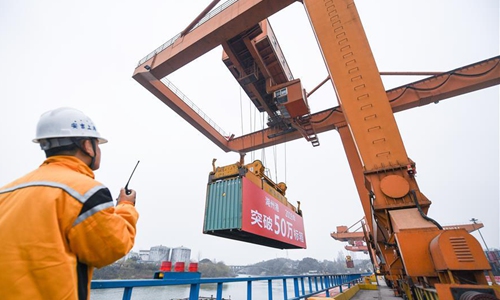HOME >> CHINA
Exporters see rebound when virus crisis ends
By Chu Daye and Yang Kunyi Source:Global Times Published: 2020/1/31 21:50:04
Restrictions on outward shipping remain biggest concern

Photo taken on Dec. 17, 2019 shows a container lifted by a gantry crane at a container terminal in Anji County of Huzhou City, east China's Zhejiang Province. The container throughput of the Huzhou Port has exceeded 0.5 million TEU by far this year, while the number of export containers raised 17.2 percent compared with the same period last year. Photo:Xinhua
There are mounting concerns from Chinese exporters over trade hours after the World Health Organization (WHO) on Thursday declared the coronavirus outbreak originating in China a global emergency.
The announcement on the new virus, which has been spreading in China and at least 18 other countries and regions, could potentially have huge implications on Chinese exports, which, however, have good odds for a rebound to make up for short-term losses, analysts said.
There was a surge in order inquiries on Friday morning, shortly after the WHO declaration, smaller manufacturing companies in China told the Global Times, adding that they are feeling increased pressure to accommodate their international clients.
"A few small clients withdrew their orders over fears of future restrictive measures," said Lin Musong, general manager of Shenzhen Enle Industrial Co, a Shenzhen-based company that produces electronic components catering to markets in the US and Europe.
The withdrawal of orders accounted for only a fraction of the company's business, but he said larger clients have been seeking information about the potential impact of the coronavirus on trade.
"The biggest concern is whether restrictions will be imposed on outward shipping," Lin said, "and the current work delay is also putting some pressure on our delivery capacity."
Although the WHO announcement on Thursday does not recommend any travel or trade restrictions based on the current available information, there have been global indications of a cut in the flow of people and goods.
Russia has closed its Far East border with China, and Trinidad and Tobago has imposed a 14-day ban on travelers from the Chinese mainland. Multiple airlines have suspended flights to China.
The diversion of international traffic and foreseeable, more stringent quarantine checkups at borders don't bode well for Chinese exports, said Guo Xin, general manager of Nanning Xinjinhang Logistics Co.
"A container that could arrive at its destination in 12 days could now potentially require two months," Guo said. "Air cargo and shipping could drop by as much as 40 percent during the first quarter."
Guo's company operates more than 100 trucks, carrying "middle products" such as electronics and cotton yarn overland to ASEAN, China's second-largest trading partner.
Guo's business has thus far remained largely unaffected. He said orders for his company's services had actually multiplied, with freight rates even doubling as customers seek alternatives to air and sea trade.
As an exporter, Guo believes border closures between China and ASEAN member states are not likely, as the economies have deeply integrated with each other. "There is no substantial trade between China and the Russian Far East. The ASEAN case is not the same. The supply chain there is too important to be cut," Guo said.
Liu Min, a China market analyst at FXTM, told the Global Times on Friday that the WHO's latest classification of the epidemic will definitely lead to a spike in costs for existing orders due to stricter quarantine measures, the time needed to load ships and the probability that new orders face delays or cancellations.
"But taking into account past experience from SARS, exports face good odds for a rebound to make up for short-term losses," Liu said. "Exports will recover once vaccines are discovered for this deadly epidemic."